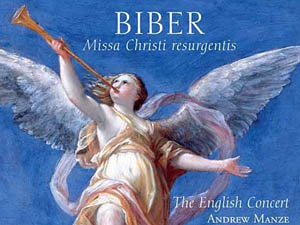|
Audio
Photos
More from MPR
Resources
|
 |
| The cover art of Biber, "Missa Christi Resurgentis" (Album Cover) |
St. Paul, Minn. — Last year marked the 300th anniversary of Heinrich Ignaz Franz Biber's death in Salzburg. To honor this 17th-century composer, the English Concert and Andrew Manze performed his Missa Christi resurgentis in France, Belgium, Holland, Spain and the UK. Now, they've just issued a recording of this Easter mass. Over the last decade or so most of Biber's masses have been recorded, some more than once. This release marks the world premiere recording of this relatively early mass by Biber, first performed in 1674.
Manze is a shining star when it comes to period instrument performance. His advice is to find the right instrument, learn the appropriate stylistic techniques, do a little background reading, and study the composer's score. He adds, 70 percent of a good Baroque performance requires strong use of your imagination. By that, he means you have to do what feels right, to read between the lines on the score to enhance what the composer wanted. It's all about the element of surprise for the performers, the audience and the composer.
In order to accomplish their unique interpretation, Manze and the four groups, which consist of two choirs, winds and strings, had to recreate the proper setting so they could let their imaginations run wild. This mass was originally performed in the Salzburg Cathedral; it has four organ galleries. To capture the original's polyphonic grandeur of time and space, they chose London's Temple Church. For the recording, each group was positioned at one of the four corners of the square within the temple.
When you listen to Baroque composers less familiar than say, Bach or Handel, Andrew Manze suggests the most important thing is to keep an open mind. Earlier composers were much less interested in structure and far more focused on the development from one moment to the next. Manze finds that very liberating. Some of the most wonderful things we hear surprise us; it can be sudden radical changes in tempo or the emotional atmosphere.
Biber catches us off guard when he starts the Credo with three solo basses, a daring, but effective way to do it. Then he shifts from one group of virtuosic singers to the next, changing the color and balance as he goes. Listening to the full, articulated sound, it's hard to believe the Choir of the English Concert is made up of only nine singers. That's one more of the many pleasant surprises this new release holds.
Overall, Biber's early mass exudes confidence and enthusiasm. Every time I listen to the "Gloria", I think, that joyful sound of celebration would make a believer out me. It is festive, yet it also has its moments of great emotional depth like in the M iserere nobis setting in the Gloria. The two choirs alternate between prayerful, heavenly thoughts, and a lively antiphonal call and response.
It was customary in Biber's day to intersperse instrumental sonatas between the movements of the mass. Even though this recording focuses on Biber's ability as a choral composer, it's very evident that instrumental music was also his forte. Each sonata offers the same sense of high energy combined with emotional depth that we hear throughout the liturgical work. The Mass is introduced by two fanfares for two trumpets, available for the first time on record. These may have been used to announce the arrival and departure of the archbishop before and after the mass. They were recorded in the galleries in the Temple Church just as they may have been in the organ galleries in Salzburg. The resonant sounds of the trumpets leave a lasting impression as they penetrate throughout the cathedral and out of my speakers.
A service filled with this gorgeous church music would eliminate any danger of snoozing parishioners. If you're familiar with Biber, you'll definitely want to pick up this new release. If you don't know Biber, this recording with Andrew Manze and the English Concert and the Choir of the English Concert is a fabulous introduction.



